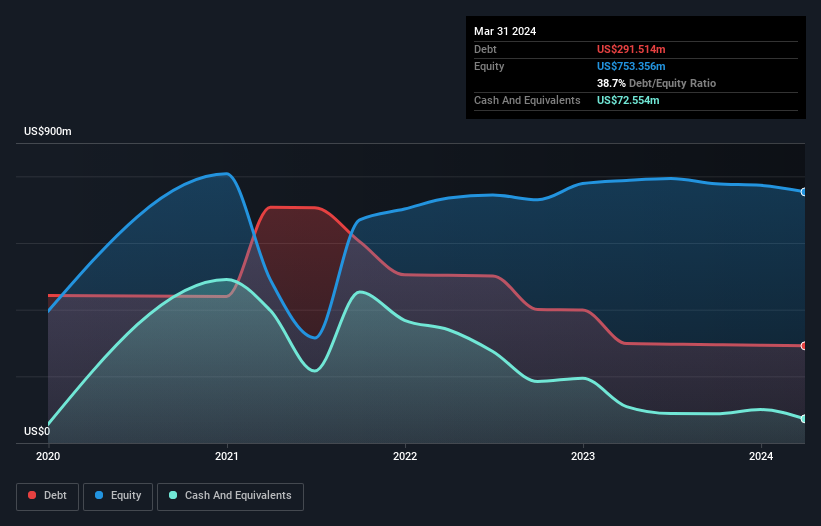- United States
- /
- IT
- /
- NasdaqGS:TWKS
We Think Thoughtworks Holding (NASDAQ:TWKS) Has A Fair Chunk Of Debt
Some say volatility, rather than debt, is the best way to think about risk as an investor, but Warren Buffett famously said that 'Volatility is far from synonymous with risk.' When we think about how risky a company is, we always like to look at its use of debt, since debt overload can lead to ruin. As with many other companies Thoughtworks Holding, Inc. (NASDAQ:TWKS) makes use of debt. But is this debt a concern to shareholders?
Why Does Debt Bring Risk?
Debt and other liabilities become risky for a business when it cannot easily fulfill those obligations, either with free cash flow or by raising capital at an attractive price. Ultimately, if the company can't fulfill its legal obligations to repay debt, shareholders could walk away with nothing. While that is not too common, we often do see indebted companies permanently diluting shareholders because lenders force them to raise capital at a distressed price. Of course, the upside of debt is that it often represents cheap capital, especially when it replaces dilution in a company with the ability to reinvest at high rates of return. When we think about a company's use of debt, we first look at cash and debt together.
Check out our latest analysis for Thoughtworks Holding
How Much Debt Does Thoughtworks Holding Carry?
As you can see below, Thoughtworks Holding had US$291.5m of debt, at March 2024, which is about the same as the year before. You can click the chart for greater detail. However, it also had US$72.6m in cash, and so its net debt is US$219.0m.

A Look At Thoughtworks Holding's Liabilities
Zooming in on the latest balance sheet data, we can see that Thoughtworks Holding had liabilities of US$132.6m due within 12 months and liabilities of US$382.6m due beyond that. On the other hand, it had cash of US$72.6m and US$264.5m worth of receivables due within a year. So it has liabilities totalling US$178.1m more than its cash and near-term receivables, combined.
Since publicly traded Thoughtworks Holding shares are worth a total of US$891.2m, it seems unlikely that this level of liabilities would be a major threat. But there are sufficient liabilities that we would certainly recommend shareholders continue to monitor the balance sheet, going forward. When analysing debt levels, the balance sheet is the obvious place to start. But it is future earnings, more than anything, that will determine Thoughtworks Holding's ability to maintain a healthy balance sheet going forward. So if you want to see what the professionals think, you might find this free report on analyst profit forecasts to be interesting.
Over 12 months, Thoughtworks Holding made a loss at the EBIT level, and saw its revenue drop to US$1.1b, which is a fall of 17%. That's not what we would hope to see.
Caveat Emptor
Not only did Thoughtworks Holding's revenue slip over the last twelve months, but it also produced negative earnings before interest and tax (EBIT). Indeed, it lost US$15m at the EBIT level. When we look at that and recall the liabilities on its balance sheet, relative to cash, it seems unwise to us for the company to have any debt. So we think its balance sheet is a little strained, though not beyond repair. However, it doesn't help that it burned through US$11m of cash over the last year. So to be blunt we think it is risky. For riskier companies like Thoughtworks Holding I always like to keep an eye on whether insiders are buying or selling. So click here if you want to find out for yourself.
Of course, if you're the type of investor who prefers buying stocks without the burden of debt, then don't hesitate to discover our exclusive list of net cash growth stocks, today.
Valuation is complex, but we're here to simplify it.
Discover if Thoughtworks Holding might be undervalued or overvalued with our detailed analysis, featuring fair value estimates, potential risks, dividends, insider trades, and its financial condition.
Access Free AnalysisHave feedback on this article? Concerned about the content? Get in touch with us directly. Alternatively, email editorial-team (at) simplywallst.com.
This article by Simply Wall St is general in nature. We provide commentary based on historical data and analyst forecasts only using an unbiased methodology and our articles are not intended to be financial advice. It does not constitute a recommendation to buy or sell any stock, and does not take account of your objectives, or your financial situation. We aim to bring you long-term focused analysis driven by fundamental data. Note that our analysis may not factor in the latest price-sensitive company announcements or qualitative material. Simply Wall St has no position in any stocks mentioned.
About NasdaqGS:TWKS
Thoughtworks Holding
Provides technology consultancy services in North America, the Asia Pacific, Europe, and Latin America.
Undervalued with moderate growth potential.
Similar Companies
Market Insights
Weekly Picks


Looking to be second time lucky with a game-changing new product

PlaySide Studios: Market Is Sleeping on a Potential 10M+ Unit Breakout Year, FY26 Could Be the Rerate of the Decade


Inotiv NAMs Test Center

This isn’t speculation — this is confirmation.A Schedule 13G was filed, not a 13D, meaning this is passive institutional capital, not acti
Recently Updated Narratives


Beyond 2026, Beyond a Double


A case for TSXV:AUMB to reach USD$2.69 (CAD$3.70) by 2030 (15X).


Freehold: Offers a fantastic growth-income intersection up to $50 WTI. Below $50 WTI, it may offer historic opportunities in terms of ROI.
Popular Narratives


Is Ubisoft the Market’s Biggest Pricing Error? Why Forensic Value Points to €33 Per Share


The "Physical AI" Monopoly – A New Industrial Revolution


Analyst Commentary Highlights Microsoft AI Momentum and Upward Valuation Amid Growth and Competitive Risks
Trending Discussion


Figma is still deeply embedded as the default design system in big companies, and the ecosystem (Buzz, Slides, Sites, Make) is clearly the strategic play rather than a one‑off product bet. None of those qualitative assumptions have really broken yet, the bigger change has been sentiment toward growth/AI software in general, not Figma’s product reality. Assuming ~30% annual growth, margins stepping up to 25%, and a 40x PE in 2030 with an 8.4% discount rate is too optimistic now considering how the broader market is now pricing similar SaaS names, which means you can believe in the long term thesis and still accept that the stock might chop sideways or even drift lower while expectations and multiples reset. I will be sharing an update soon.

I think of AI robots more as shells that access realtime downloads about a required task from cloud based information libraries. Think of it more like the Matrix when someone needed to know how to fly a helicopter. Therefore the "how to” libraries will be critical for generic bots with great dexterity. It seems to me that the Project Cosmos model has a better opportunity to build the best general use library. I mean how much information could Tesla have gleaned about gardening for example from an autonomous vehicle operation? That said Tesla could be more of just a hardware company than Apple was. It will all depend on Tesla’s information library and their pricing model(s) Optimus is the clear front runner in dexterity and elegance.



